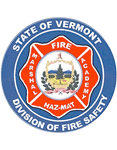Working smoke and carbon monoxide alarms are the most important devices you can have in your home. They provide essential early warnings of a problem so you and your family can safely escape.
Vermont law has required smoke detectors (alarms) to be installed in single-family dwellings since 1994. Smoke alarms have been required to be installed in multi-family and rental dwellings for more than 30 years.
One common factor in most fatal fires is the lack of properly installed, and working smoke alarms. More than one smoke alarm is needed in most dwelling units to make sure that people can hear the alarm and have time to escape. Smoke alarms need to be properly installed, maintained and replaced when needed.
Vermont’s Requirements for Photoelectric Smoke Alarms
The type of smoke alarm is also important, requirements for the use of photoelectric only smoke alarms were established in 2008 by the legislature. Photoelectric-only type smoke alarms are required to be installed in the vicinity of any bedrooms and on each level of a dwelling. New dwellings must have alarms directly wired to the building electrical service and have a battery backup. Dwellings that are sold or transferred after January 1, 2009 are required to photoelectric and carbon monoxide alarms installed and working.
The law allows the use of photoelectric and carbon monoxide combination alarms but it does not allow ionization/photoelectric combination alarms to be used for these specific locations. Many existing Vermont homes currently have old outdated ionization smoke alarms installed. These old alarms need to be replaced. The division recommends to homeowners that when you are replacing alarms that you update to a photoelectric smoke alarm now and not wait until the time when home is being sold.
No home should be without smoke alarms, and ionization alarms should continue to be used until a home can be equipped with new photoelectric alarms.
Owner – Occupied Single Family Free Standing Dwellings
Smoke Alarm Rules and Requirements
The requirements for smoke alarms in owner-occupied single family dwelling come out of state law. Vermont’s smoke alarm law TITLE 9 V.S.A. §2882(a)(b) has required smoke detectors (alarms) to be installed in single-family dwellings since 1994.
Rental Units, Condos and Multi Family Dwellings or other Residential Public Buildings
Smoke Alarm Rules and Requirements
The requirements for smoke alarms in Rental Units, Condos and Multi Family Dwellings or other residential buildings come out of Vermont fire and building safety codes.
The Vermont fire and building safety code applies to “public buildings” as defined in title 20 chapter 173 § 2730. The term public building include any condominiums or multiple unit dwelling using a common roof, or row houses so-called, or other residential buildings in which people sleep, including hotels, motels, and tourist homes, whether the units are owned or leased or rented.
Laws, Rules and Statute
Vermont Smoke Alarm Law 9 V.S.A. §2882(a)(b)
Vermont Fire & Building Safety Code General provisions law 20 V.S.A. §2729(d)
Forms
Smoke / CO alarm certification form used for home sales
DFS Request for Inspection of Public Building
Information
Smoke Alarms Installation Matrix Sheet
Additional smoke alarm Information Resource Links
How Stuff Works "How Smoke Detectors Work"
U.S. Fire Administration - Fire Protection Technology

